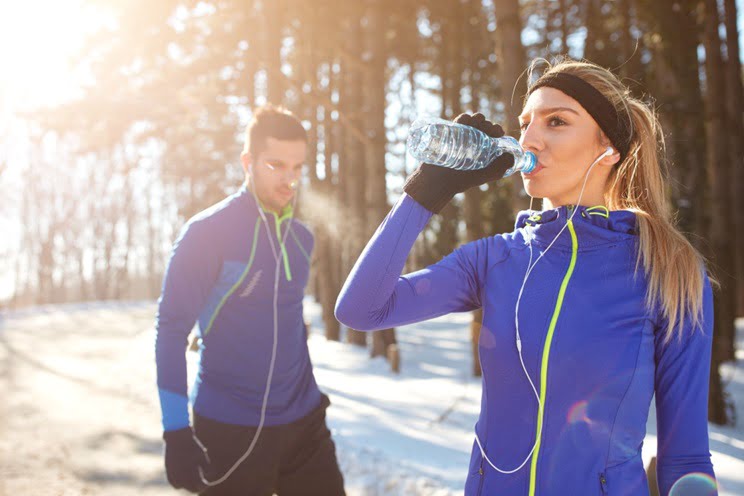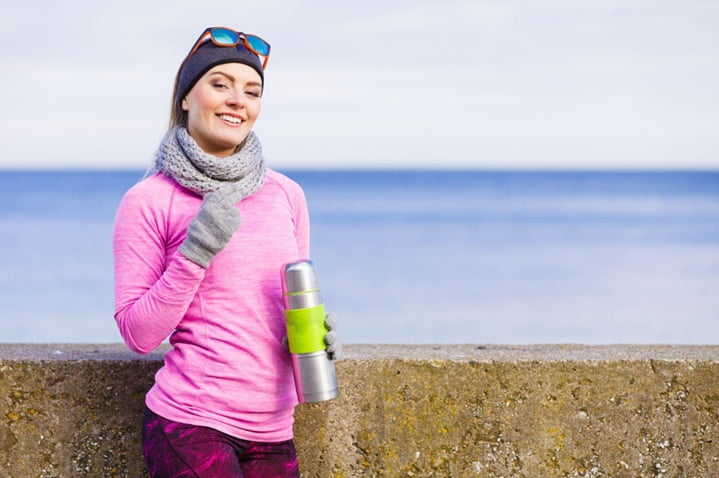
Hydration During Winter Sports: What You Need to Know
Hydration During Winter Sports: What You Need to Know – Hydration is important for athletes and is just as crucial during the winter months as it is during the summer. Of course, when it’s cold outside, we drink less water because we don’t feel as thirsty. But even mild dehydration can negatively impact our performance on the slopes or ice. So how can we stay hydrated during winter sports? We’ll explain that and more as we explore hydration strategies for athletes during the winter.
Table of Contents
Hydration Basics: What You Need to Know
Let’s start with a few basics about hydration.
When we sweat, we lose water and electrolytes like sodium and potassium. These electrolytes are essential for proper muscle function and fluid balance in our bodies. We can become dehydrated when we don’t replace the fluids and electrolytes we’ve lost through sweating.
Dehydration can lead to fatigue, cramping, and even illness. In severe cases, it can be life-threatening. That’s why it’s so crucial for athletes to stay properly hydrated during exercise — no matter what time of year.
Now that you know the basics of hydration, let’s answer some common questions about staying hydrated during winter sports.
FAQs About Hydration During Winter Sports
Can I become dehydrated in winter?
Yes, you can become dehydrated in winter just as easily as in summer. In fact, dehydration is a common problem among skiers, snowboarders, and other winter-sport athletes.
One study of adolescent alpine skiers found that more than 50 percent were dehydrated after a day on the slopes. And another study of elite cross-country skiers found that up to 60 percent were dehydrated both before and after racing, negatively impacting their energy levels and affecting their performance.
Why don’t I feel thirsty in winter?
To answer this, we first need to understand what thirst is. The thirst response is controlled by a part of the brain called the lamina terminalis. Researchers believe it helps monitor the amount of fluid in one’s body, affecting blood volume and pressure. This is done by detecting electrolytes like sodium. When our overall fluid levels are low, we get thirsty so we can drink and raise our fluid levels back up.

Now, why don’t we feel thirsty in winter? Well, it concerns the cold and how our bodies respond to it. When we’re cold, our body instinctively pulls blood from our extremities to our core to help keep us warm. Unfortunately, this can lead to the brain’s inability to detect low blood volume and higher electrolyte concentrations, which would otherwise trigger the thirst response. In fact, in some people, the thirst response is decreased by up to 40 percent.
How can I tell if I’m dehydrated?
Dehydration can cause many problems, from headaches and fatigue to dizziness and nausea. So it’s essential to recognize the signs of dehydration, even when they’re not as apparent as in the summertime. Here are some common symptoms of dehydration to look out for during winter:
- Dry mouth or lips
- Urine that is dark yellow or amber in color
- Fatigue or lethargy
- Headache
- Dizziness
- Nausea
- Confusion or disorientation
These are just some of the more common signs of dehydration. There are also more extreme signs, which can be life-threatening. These include:
- Fainting or passing out
- Extreme thirst
- Rapid heartbeat
- Seizures
Do I need to drink more water in the winter?
As we’ve mentioned, you might not feel as thirsty in the winter, but that doesn’t mean you don’t need to drink as much water. In fact, you might need to consume more fluids during winter activities than you would during spring or fall. This is because, in the winter, your body uses more energy to maintain its core temperature, which can lead to increased fluid loss. So in a similar manner to how you’d increase your intake of calories during winter, you also need to improve your fluid intake.
Tips for Staying Hydrated During Winter Sports
It’s important to stay hydrated when participating in any physical activity, but it’s vital during winter sports. As we’ve learned, the cold weather can make it harder to drink enough fluids, and being active can make you sweat even if you don’t feel hot. Here are some solid tips for staying hydrated during winter sports:
1) Drink fluids before, during, and after your game or event.
This one might seem obvious, but it’s worth emphasizing. The best way to prevent dehydration is to drink fluids regularly throughout the day, including before, during, and after physical activity. Make sure you always have a water bottle with you, and take a few sips every 15 minutes or so. If you’re participating in a strenuous activity like skiing or hockey, you should up your intake to every 10 minutes. And don’t wait to feel thirsty to drink — by the time you feel thirsty, you’re already dehydrated. But, of course, that is if the thirst trigger ever kicks in at all.
2) Look for warm options to make them more appealing.
Water is always the best for hydration, but sometimes it’s just not that appealing when cold outside. If plain water isn’t cutting it, try looking for warm options like herbal tea, bone broth, or vegetable broth. These options are great because they also deliver nutrients necessary for immune health.

3) Add water-rich foods to your diet.
Eating water-rich foods is another great way to stay hydrated — and they can be beneficial if you don’t like the taste of plain water or you’re struggling to drink enough fluid throughout the day. Some good options include:
- Fruits and vegetables
- Soups and stews
- Yogurt
4) Use electrolytes to help hydration.
Electrolytes are minerals like sodium and potassium that help regulate fluid balance in the body. They can be found in many healthy foods in a complete and balanced diet. However, during strenuous sporting activities where dehydration is a risk, supplementing with electrolyte powder to ensure that you’re getting enough of these minerals is a good idea. Another great option is electrolyte pills, which can be conveniently taken anywhere.
Conclusion
Dehydration is a severe problem that can occur during any physical activity — but it’s prevalent during winter sports because of the combination of cold weather and strenuous exercise. So make sure you’re drinking plenty of fluids before, during, and after winter sports activities. In addition, consider adding electrolytes to your diet if you still have trouble staying hydrated.


